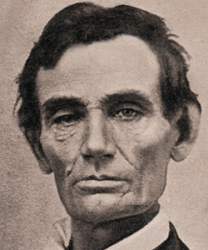Record Data
Transcription
Speech at Springfield, Illinois
June 10, 1856
Mr. Lincoln opened his speech, and for more than an hour he bored his audience with one of the weakest speeches that he ever perpetrated. He was evidently laboring under much restraint, conscious that he was doling out new doctrine to the old whigs about him, and fearful that in keeping within moderate bounds, he would so filter his discourse that it would not in any degree reach the end he desired. He would occasionally launch out and lead his hearers to think that the most ultra abolitionism would follow, when, under the old whig eyes we have mentioned, he would soften his remarks to a supposed palatable texture. In this way, backing and filling, he frittered away anything of argument that he might have presented, convincing his audience, however, that his niggerism has as dark a hue as that of Garrison or Fred Douglass but that his timidity before the peculiar audience he addressed prevented its earnest advocacy with the power and ability he is known to possess.
The gist of his remarks were intended to show that the democratic party favors the extension of slavery, that black republicanism aims to prevent it; by what process we did not learn from him, nor did he furnish any evidence of the truth of his allegation against the democracy. He was opposed to the extension of slavery. So are we. But we desire to see it done in a constitutional manner---by the act of the people interested. For leaving the decision of the question there, by the adjustment of '50, and by the Nebraska act, black republicanism has raised another furor in the country, and until very lately, they have claimed for congress the power to refuse the admission of any new state recognizing slavery by its constitution. Latterly, this plank of their platform has been suppressed. We heard nothing of it on Tuesday evening from Mr. Lincoln. The same caving in as to the restoration of the Missouri restriction, marks the latter day policy of the sectional party, and he as cautiously avoided it. They seek power, Mr. Lincoln naively told us, by the agglomeration of all the discordant elements of faction, and if obtained, the now suppressed platform of ultra abolitionism will be avowed and acted upon. He boldly avowed, in one of his many escapings, that there could be no Union with slavery. That agitation would be ceaseless until it shall be swept away, but the mode of its eradication he left to inference from his own antecedents and those of the ruling spirits of black-republicanism---Garrison, Greeley, Seward, Sumner, and others of that genus.
To attain power, by whatever means, was the burden of his song, and he pointed to the complexion of the Bloomington ticket as evidence of the desire of the factions to attain it by any process. Bissell, a renegade democrat, headed it. Hoffman, a German nondescript, followed; Miller, ex-whig and probable know-nothing, followed next, while Hatch, Dubois and Powell, avowed know-nothings, brought up the rear. With such a medley---such a fusion of opposites, none can doubt that the end and aim of the Bloomington organization is ``power''---and place, and that its managers would sink any principle, trample upon right, law and constitution to attain their object.
Mr. Lincoln's allusion to Bissell's services as a warrior was singularly malapropos, in him, at least; Bissell's laurels having been won in a war, the ``identical spot'' on which it commenced never could be learned by Mr. L., and consequently had his inveterate opposition during its entire progress, by his congressional action in hampering the democratic administration in its prosecution. In this connection, Bissell may well exclaim---``Save me from such backing!''
Except from the squad of claquers we have mentioned, Mr. Lincoln's remarks were received with coldness. He convinced nobody of his own sincerity, of the justness of his cause, nor did he elicit any applause except from the drilled few who occupied the front benches.









